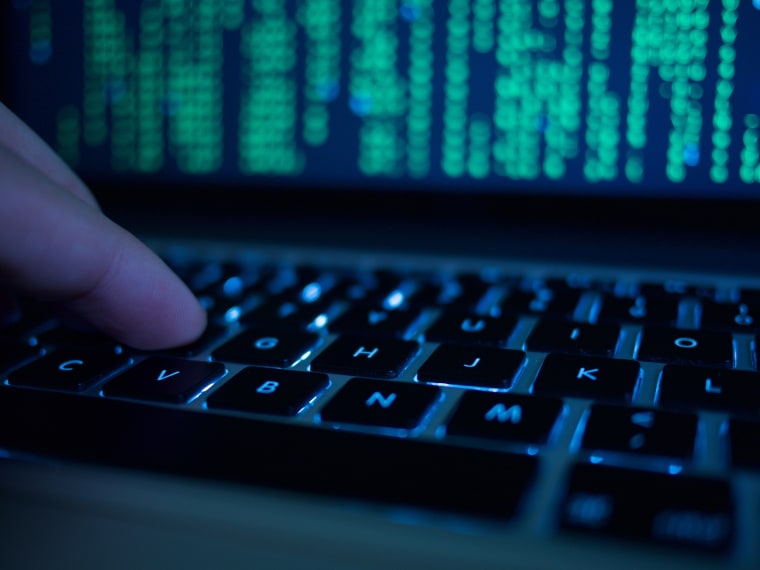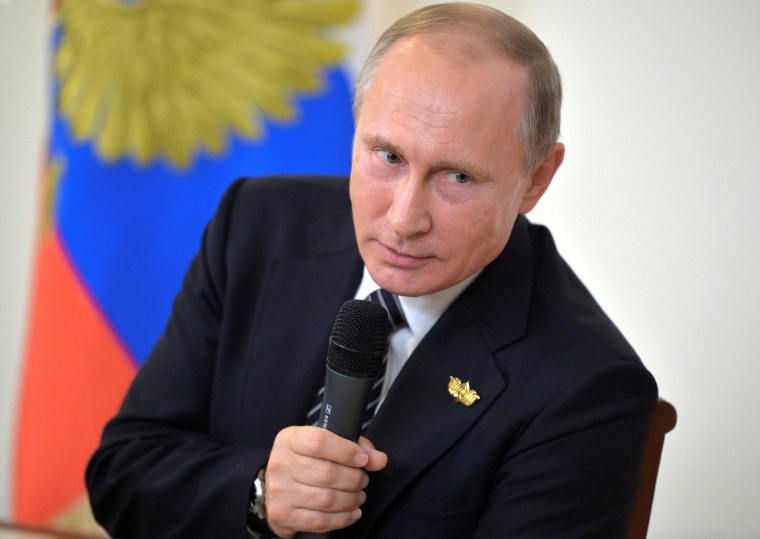The new leak of 8,000 hacked DNC emails is a textbook example of how the Putin regime ramps up state-supported active measures on the eve of an election, a top former U.S. intelligence official and Russia expert told NBC News.
Fiona Hill, who wrote a book about Putin’s rise to power, ticked off a series of other elections, including Ukraine, Montenegro and Georgia, that featured eleventh-hour propaganda blasts and Russian military aggression.
Hill said the daily torrent of leaked emails, plus Putin’s dispatch of Russia’s lone aircraft carrier to Syria, fits the pattern of Russian escalation prior to a major event.
“He is trying to reset the relationship in a very confrontational way by kicking us when we’re down, and piling everything on at the weakest and most vulnerable moment,” said Hill. “There is a longstanding and very clear pattern of this, and cyber is just one of many weapons he uses.”
Other examples, according to Hill and others: WikiLeaks founder Julian Assange’s “exclusive” pro-Russia interview with Russian media outlet RT, numerous reports of fake tweets and news stories sowing confusion about the U.S. election, and increased propaganda about how the U.S. is really behind the hacking campaign.
On the eve of the Russian presidential election in 2012, new U.S. Ambassador Michael McFaul found that someone had created a fake Twitter account for him and was using it to allege election fraud. "The fake account could have been put up by someone in Russian opposition looking to stir up doubt about the election. Obviously, we never found out who was behind it."
As Russian intervention in other countries’ elections has shown, attempts to manipulate the outcome by tampering with internet and social media platforms could be hugely disruptive, especially in real time when the information matters the most.
“A coordinated disinformation campaign would happen quickly through use of trolls and digital [troll] farms all over the world,” said Moira Whelan, a former senior strategic communications official at the State Department and the Department of Homeland Security. “With some states having just hours to cast their votes, any effort that may keep someone from a polling place or change their mind can have an impact.”
Stopping a disinformation campaign, especially a state-sponsored and sophisticated one, isn’t easy, Whelan said. It would require coordinating complex responses in real time across many government agencies, and with media and social media companies that are reluctant to interfere with any kind of messaging due to First Amendment concerns.
“The best thing the government can do now is help the private sector and the public prepare,” said Whelan, of BlueDot Strategies. With open communications lines, “they can share information and limit the scope and scale of an electronic attack.”

The latest email dump, via WikiLeaks, has also stoked fears among U.S. intelligence officials that Vladimir Putin will keep escalating Russia’s disinformation campaign after Tuesday’s election. They believe he’s not just trying to undermine the legitimacy of tomorrow’s voting but wants to undercut the effectiveness of whichever candidate takes office.
“Don’t think that the Russian activity was solely about the election, or about Trump,” a senior U.S. intelligence official told NBC News. “It wasn’t. It was about their agenda, what they are trying to accomplish” in expanding Russia’s power and influence throughout the world.
Evelyn Farkas, a former senior Russia expert at the Pentagon and State Department, said the flurry of suspicious activity shows that Putin “is working on strengthening his negotiating position with the next president. The more he can show he can make life uncomfortable for America and Americans, and undermine confidence in the election and our Democratic institutions, the stronger he thinks his negotiating position is.”
Several current and former U.S. officials said Putin has been using the hacking campaign to learn as much as he can about both candidates and their inner circles, to embarrass and compromise them when the time is right.
To date, few of the leaked emails have been about Clinton herself, instead focusing on the infighting among those around her and former President Bill Clinton and their foundation. And nothing has leaked from Republican campaigns, including that of GOP nominee Donald Trump, even though NBC News reported Oct. 8 that U.S. officials believe Russian hackers targeted both parties.
That could change, especially if Trump wins on Tuesday, and Russia decides it needs to obtain leverage against an incoming Republican administration.
“They are obviously still collecting,” said the senior U.S. intelligence official. “What are they going to do with that?"

